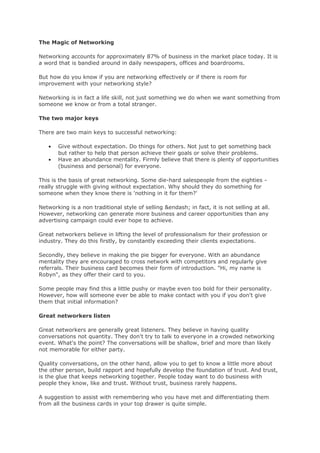
Robyn Henderson The Magic Of Networking
- 1. The Magic of Networking Networking accounts for approximately 87% of business in the market place today. It is a word that is bandied around in daily newspapers, offices and boardrooms. But how do you know if you are networking effectively or if there is room for improvement with your networking style? Networking is in fact a life skill, not just something we do when we want something from someone we know or from a total stranger. The two major keys There are two main keys to successful networking: • Give without expectation. Do things for others. Not just to get something back but rather to help that person achieve their goals or solve their problems. • Have an abundance mentality. Firmly believe that there is plenty of opportunities (business and personal) for everyone. This is the basis of great networking. Some die-hard salespeople from the eighties - really struggle with giving without expectation. Why should they do something for someone when they know there is 'nothing in it for them?' Networking is a non traditional style of selling &endash; in fact, it is not selling at all. However, networking can generate more business and career opportunities than any advertising campaign could ever hope to achieve. Great networkers believe in lifting the level of professionalism for their profession or industry. They do this firstly, by constantly exceeding their clients expectations. Secondly, they believe in making the pie bigger for everyone. With an abundance mentality they are encouraged to cross network with competitors and regularly give referrals. Their business card becomes their form of introduction. "Hi, my name is Robyn", as they offer their card to you. Some people may find this a little pushy or maybe even too bold for their personality. However, how will someone ever be able to make contact with you if you don't give them that initial information? Great networkers listen Great networkers are generally great listeners. They believe in having quality conversations not quantity. They don't try to talk to everyone in a crowded networking event. What's the point? The conversations will be shallow, brief and more than likely not memorable for either party. Quality conversations, on the other hand, allow you to get to know a little more about the other person, build rapport and hopefully develop the foundation of trust. And trust, is the glue that keeps networking together. People today want to do business with people they know, like and trust. Without trust, business rarely happens. A suggestion to assist with remembering who you have met and differentiating them from all the business cards in your top drawer is quite simple.
- 2. Make notes on cards After you meet a person and exchange cards, you may like to make a note on the back of their card. Include the date and place where you met and something that you remember about them. Preferably something you spoke about that was not work related. e.g. golf, grandchildren, tennis. Great networkers attend networking events at least once a week wherever possible. Rather than belong to a lot of networks and go to each of them occasionally, they belong to one or two and attend regularly. In that way, they become known as the 'real estate agent" or "financial planner" for that group. It may take time to generate business however, every time they attend that group, they become more well known and their reputation grows. Tracking separate networks You may start a separate business card holder for each network that you belong to. After attending each meeting and exchanging business cards with a variety of people (making the notes on the back of their cards), you can then place their cards in this specific holder. Then, when you are returning to that network, refresh your memory on who the people are by glancing through your specific holder. In the networking world, it's not who you know, it's who knows you.
